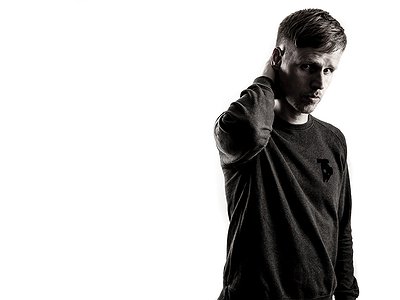Part 2
It has today almost become customary to radically change pieces in the act of mixing and to increase the creative input of the DJ even to the level of the actual composition. What's your take on that and in how much do you make use of these possibilities yourself? Is there such a thing as 'disrespectful mixing'?
Haha, no I don’t think there’s such a thing. There’s bad DJs that do bad mixes that don't make any sense or even worse, are simply boring. The music is free for everyone to use to their own advantage in my opinion. Go crazy!
I just love to be able to take apart tracks, rearrange them live on stage or in Ableton on the way to a DJ gig, it’s all part of the art. It’s about making something your own, defining your own sound through the sound of others.
On Fabric 83, as on your classic Balance mix, there are several tracks playing almost all the time throughout the entire album. I've always been curious about what attracted you to the concept in the first place. Can you tell me just a little bit about the first time you worked this way and in how far you've refined this technique from Balance 14 to Fabric 83?
I heard this almost mechanical way of flawless mixing from Richie Hawtin’s DE909 series for the first time. It was like making music with music, in an unconventional way, and I loved it. The outcome wasn’t always that exciting, as you have to really be careful to keep things interesting with this technique, but I took the challenge on my first mix CD for Fuse Brussels in 2005, and I have been fine-tuning it since.
This technique allowed me to create something completely new with other people's music, mix things at different bpm together and change the pitch of a melody. It’s not so much DJing anymore but creating a journey on another level.
It would seem hard enough getting the blend between two tracks right, so how do you arrive at constellations of 4-5 records at the same time? What are some of the considerations that go into these multi-layered pieces and what are the benefits?
To start, it’s never my intention to stack as many tracks as possible. I just mix and match and see where I can create something interesting with all those loops, mix them in and out slowly and layer one over the other. The result of this deconstruction can be a very rich sound that’s more than the sum of its parts. Most of the tracks I use won’t be so interesting if I played them one after the other, they are merely tools and intros or breaks of tracks. Together they form something unique, something only I at that point can come up with.
One of the most important aspects of a DJ set are the transitions from one track to the next. What makes a transition successful from your perspective? What are some of the considerations that go into deciding which track to play next - are these purely subjective to you or are there objective things that work or don't work?
A DJ set is ideally a journey. I like playing 20 or 30 minutes of just drums at the beginning of a set, before something like a melody comes in. You lay a basis like that to build on and it’s the beginning of a journey. Transitions then can be smooth, but later on in a set more abrupt, to change the direction of a set and surprise people. It’s all about diversity if you ask me. A good mix is indeed quite a subjective thing, and is also highly genre-dependant.
How do you see the balance between giving the crowd what they want and treating them to something new? What's your take on the idea of the DJ as an "educator" and is the relationship with the dancers a collaborative one or, as Derrick May once put it, a “battle”?
I am there for the people, and I will always try to make them dance. Part of me likes to be an educator and show people something new, something inspiring or something they already know in a new form. It’s that interaction with the crowd that keeps me inspired.
It is customary for many DJs to also produce tracks of their own, thereby lifting the former 'division of labor' between the two. How do you feel about this – and in which way can both sides benefit from this? How does your work as a DJ influence your studio productions and vice versa?
I couldn’t imagine being just a DJ or just a producer. It’s the excitement of playing a new track in a set that I love most. It allows me to know what works on the dance floor, how the mix should sound and if the arrangement works. It’s a perfect balance.
With more and more musicians creating than ever and more and more of these creations being released, what does this mean for you as an artist in terms of originality? What are some of the areas where you currently see the greatest potential for originality and who are some of the artists and communities that you find inspiring in this regard?
I am mostly interested in creating memorable music. I love to play DJ tools and grooves, but don’t mind when other people focus on creating these. I’m first and foremost looking for something that stands out when I’m producing. It’s also the shortest way to success as nobody will remember a DJ tool when they go home at night.
One of my good friends in the industry is Kolsch, he has an amazing and very versatile sound and works from the same ethic as me even though we sound quite different.
Another artist is Sebastian Mullaert from Monologue who creates the most beautiful music on an almost spiritual level. I’m less interested in bandwagon DJs that just jump on anything that’s hot at the moment.
Reaching audiences usually involves reaching out to the press and possibly working with a PR company. What's your perspective on the promo system? In which way do music journalism and PR companies change the way music is perceived by the public?
It’s not so much the PR agencies or journalists that change people’s perception. The monster of social media, an instrument played by most DJs these days is a much more defining thing.
There are blogs and magazine’s that have a very specific voice and target audience, of course they have a certain power, but I like to think people are smart enough to pick what they like.
Getting an interview, feature or review on a high rated blog isn't a guarantee to success, what they write about and what really works for a bigger audience usually aren’t the same.
It is remarkable, in a way, that DJing has remained relevant for such a long time. Do you nonetheless have a vision of DJing, an idea of what it could be beyond its current form?
When I started DJing it all came from the love of music and to be able to be part of it, creating something to a certain extent.
It’s true that there’s DJs in the business for different reasons nowadays, but that’s their issue not mine.
I sometimes wonder why the business has grown so big, but it’s the fact that people like to gather and dance that makes it possible. Sharing those moments together with your friends or strangers can be magical, people will always be looking for that. It’s a fundamentally different experience than going to a concert and not a replacement in any way.
Besides that, I believe in the concept of techno, the 4/4 beat. That will always be a strong force to keep the movement going.






